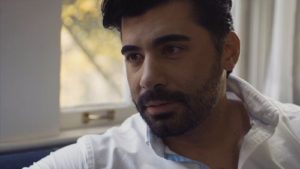
AoBFF 2021-Indie Film Review “The Desiring”
WATCH THE TRAILER HERE
First, the Recap:
What is it to want, to yearn, to long for, to fulfill? Daily, whether from the viewpoint of the physical or emotional, there is that sense of need we seek, to be satisfied in any and all ways we can. It can often define our existence, leading us down path we hope are not only sufficient, but healthy, leaving us with new purpose, new perspective, new joy. However, when the ghosts of a jaded past come calling, and circumstances suddenly change, can we withstand the turmoil that follows–or be swept away by an unforgiving tide of potentially lasting negativity? For Richard (Joseph Gray), life has taken a turn for the latter upon finding out the specters left from an overtly religious father are alive and well within him, soon infiltrating his marriage with Claire (Suzanne Lenz), and leading to the subsequent revealing of an affair she’s having with another man (Don DiPetta). But, will it be a cyclone of rage that takes hold, or will Richard discover something far more disturbing–and uniquely potent–his attraction to it.
Next, my Mind:
In the realm of film, we all realize that originality and/or true uniqueness in stories is sometimes hard to come by as, let’s face it, in some form, everything’s been done before. However, leave it once again to the independent film community to offer up a narrative utilizing the oft-done thematic exploration involving a cheating spouse and turn it all on its head to deliver the goods in what this critic felt was a solidly, surprisingly refreshing way. Screened as part of the 2021 Art of Brooklyn Film Festival, and taking home a well-deserved production-based win for “Outstanding Director of a Narrative Feature”, this 80-minute indie feature from director/producer/editor Byron Lamarque and writer/producer/cinematographer Graham Pritz-Bennett wears its tale’s foundational basis with expected simplicity but then re-directs the outcome of events to an extent that not only makes the film highly engaging, but also deeply evocative in the way it causes us to look at our overall humanity, the damaging impact of traumatic childhood experience, then its influence on us in adulthood.
Providing us an account of a man already battling his inner demons plus a marriage in flux then discovering (to his initial disconcert) an affair being carried out by his wife (much less with who–WATCH the film!), the twist in exactly how he chooses to both absorb the shock but then embark on a wholly different personal awakening from it is beautifully orchestrated and carries with it that deft character-driven manner and tone that makes indie cinema the excellent animal it is. Tackling concepts ranging from betrayal, religious judgment and fanaticism, internal anguish and the hurts we end up nurturing, what we witness and learn from our parents whether for good or ill, commitment, what it is to actually SEE someone in a relationship, that intimacy isn’t always a solution, what it is to truly LIVE in love, finding out what it is we are really seeking, and re-capturing what we had with someone in a new way, the film then asked an even more integral question–what does it say if we ACCEPT that which should destroy us? In the context of this project, it’s that query that stands out amongst a myriad of ideas, especially given the nature of what we witness and how things transpire.
Additionally, it’s the baseline relevancy of exactly how much we DO allow so much we’re brought up in to take a hold of us, which normally we’re hoping is for the better. But here, it’s a real, sobering, unflinching portrait of harboring the insidiousness of self-loathing, inadequacy, self blame, and building rage that tends to finally find a means to explode. Yet, as hinted at above, this film makes a bold choice to not only encompass these elements of the lead character’s demeanor, but then point it towards his plight in a manner not typical of someone facing the situation he us. Rather, there’s an unanticipated outcome that leads us to a finale that certainly wasn’t what I would have seen coming. But it WORKS, and that is the magic of it all. We’re entreated to this raw illustration of utter disloyalty and the repercussions/reverberations it sends out for Richard’s character (who’s decidedly emotionally compromised as it is), yet ends up a strangely affirming, dare we even say stirring, journey of release and realization. Brilliantly executed from start to finish, a complete credit to Lamarque, Pritz-Bennett and Co. via the film’s intelligent writing and magnificent award-winning directing.
Gray is all smolder, bottled up then explosive intensity, and quietly but no less purposeful understatement through his role as Richard, a man just trying to make any sense of a childhood ultimately plagued by disappoint, disillusionment, and a harsh reality that’s now left him heavily scarred within. Desperate to find the solution to a now-faltering marriage to a woman he still clearly loves, Richard’s discovery of her infidelity threatens to push him over the edge. Instead, though, he ends up finding a haunting fascination that propels him into an entirely different outlook and intent with it all. Whether it will bring about an ending or a new beginning becomes the path being traveled, and it’s a stormy sea Richard then has to encounter even as he continues to question everything about who he is and how to be freed. It’s a fantastically delivered character that Gray manages to embody and navigate through all the varying degrees of emotional strife being conveyed with believability and plenty of arresting presence, apropos for this role.
Lenz is a beautiful picture of poise and grace while likewise shining with a level of calm, muted intentionality that oozes both strength and vulnerability in her performance as Claire, Richard’s apparently dissatisfied wife who makes the choice to seek out what she needs through another man. Yet, it is this choice that makes her own inner questioning come to light, even as she confides more in her new man rather than in Richard and despite the latter’s attempts to regain what they’ve seriously lost sight of. It’s a nuanced performance throughout, and Lenz does an amazing job at making us feel for Claire despite her indiscretion. DiPetta has what some would say is the dubious honor of playing “the other man” (name withheld purposely here) whom has no qualms about pursuing the illicit affair he’s a part of. Yet, even as things unfold, his own confidence in what is happening turns almost to a more emotional attachment that begins to transcend at least some of their physical moments, perhaps his own conscious and self-assessments starting to occur. Again, it’s an exercise in more subtle yet profound impact the character has on events depicted, and DiPetta very much brings that sense of refined precision to the role that befits it.
Supporting appearances are made from Randy Spence as Richard’s religiously-minded-to-extremes father John in the multitude of flashback sequences we see that outline Richard’s internal pain, Cathrine Lellie as Richard’s mother Linda, Laura Woyasz as Mary, Richard’s boss, Timothy Perez-Ross as Mary’s husband Michael, Treas Ross as the younger version of Richard and who’s portrayal is so highly effective in its volatility and innocense, along with Pamela Hardy, David Price, Jessica Pruehs, Tina Reynolds, and H. Jazz Undy. In total, “The Desiring” is, once more, a wonderfully outstanding, fully compelling study in the depths of mental, emotional, and spiritual pain manifesting from the afflictions of the past, seeing how it has bled into our present, effects our relationships, and the unforeseen consequences it can then have which will either cause more torment or possibly a road to reconciliation and redemption we never predicted.
As always, this is all for your consideration and comment. Until next time, thank you for reading!






